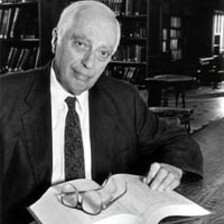The Electronic Intifada 20 November 2007
WASHINGTON, 12 November (IPS) - A small group of Middle East and African studies scholars in the United States has announced the creation of a new professional association to change the direction of scholarship in the field.
And it boasts several big name albeit controversial scholars, among them Bernard Lewis and Fouad Ajami, two academics who advised the George W. Bush administration’s policy towards the Middle East.
Citing the “the increased politicization of these fields, and the certainty that a corrupt understanding of them is a danger to the academy as well as the future of the young people it purports to educate,” the newly formed Association for the Study of the Middle East and Africa (ASMEA) aims to offer “dispassionate” study of the region.
“Given the importance of these regions, there is an acute need for objective and accurate scholarship and debate, unhampered by entrenched interests and allegiances,” said Lewis, who will act as chair of the newly formed association, in a statement last week.
In a brief interview with the online news source insidehighered.com, Mark T. Clark, president of ASMEA, said the goal of the organization was to be supported entirely by members’ dues, in order to preserve its independence. Clark acknowledged that ASMEA had received some “private contributions” in order to get off the ground, but he declined to say who had given the funds.
However, critics argue that while ASMEA presents itself as an independent alternative to the status quo and the “politicization” of the field, the membership of the newly-formed group suggests just the opposite.
“The most structurally influential bias is the bias we see in our own government’s foreign policy,” said Bassam Haddad, director of the Middle East Studies Program at George Mason University and the director of “Arabs and Terrorism,” a 10-part documentary series that analyses the discourse on terrorism.
“What [Lewis] is basically saying is a third party is the way forward, but it looks like he’s condemning his own approach and mode of scholarship, because he is, according to public record, the one affiliated with interests that are more explicitly connected to politics.”
In addition to Lewis and Ajami, ASMEA’s academic council includes Leslie Gelb, president emeritus of the Council on Foreign Relations, George P. Shultz, who served as secretary of state under President Ronald Reagan, and Victor Davis Hanson, a military historian who is also aligned with the neoconservative movement.
Haddad said that the Middle East Studies Association (MESA) — which ASMEA ostensibly aims to challenge — was not “ideal,” but it had nonetheless set the terms of Middle East scholarship and would continue to be the “signature forum.” He said that while MESA was critical of US foreign policy in the region, it was equally critical of the political status quo in the Middle East. ASMEA, he said, would probably continue to “toe the line” for Middle East states, many of which are authoritarian regimes that remain Washington’s allies.
”[ASMEA] is a protracted knee-jerk reaction that will always be viewed as a political response, rather than institution that is concerned with the Middle East,” said Haddad. “It is a response, rather than an organic expression of a desire to learn.”
ASMEA plans to hold its first conference in April in Washington, where members will discuss the evolution of Islamic politics in the Middle East and Africa.
Lewis, perhaps the most widely read scholar on the Middle East, has in recent years become controversial for his political views and support for the Iraq war. In 2002, he wrote the book “What Went Wrong? Western Impact and Middle Eastern Response,” which posited that the Islamic world has failed to modernize or to keep pace with the Western world. Lewis has also emerged as the chief ideologue of the Bush administration policy in the region.
In March, Lewis received the Irving Kristol Award at a black-tie dinner sponsored by the Washington-based neoconservative think-tank American Enterprise Institute.
During the 2006 Israel war on Lebanon, Lewis went so far as to warn, in the opinion pages of the Wall Street Journal, that Tehran might drop a nuclear bomb (which it does not have) on Israel on 22 August 2006, coinciding with the day that the prophet Muhammad went to Jerusalem and then to heaven. Hastening the apocalypse would ensure the return of the hidden imam, currently in occultation.
“This might well be deemed an appropriate date for the apocalyptic ending of Israel and if necessary of the world. It is far from certain that Mr. Ahmadinejad plans any such cataclysmic events precisely for 22 August. But it would be wise to bear the possibility in mind,” Lewis wrote.
Critics continue to question Lewis’s methodologies.
“In recent years, all of his political pontifications have been problematic. All of his prognostications about Iraq have failed,” said Sinan Antoon, a professor of Middle East studies at New York University.
“This is a very bizarre approach to all things Islamic, an apocalyptic view of contemporary politics.”
All rights reserved, IPS - Inter Press Service (2007). Total or partial publication, retransmission or sale forbidden.
Related Links







